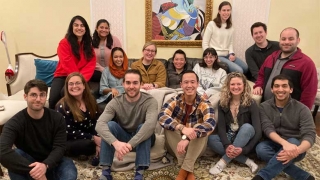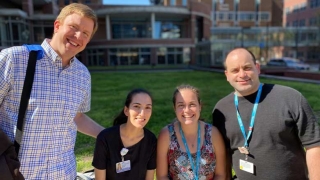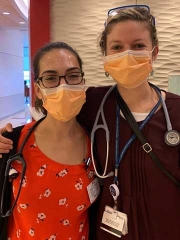Hematology / Oncology Fellowship Program
Overview and Mission
 The mission of the Hematology/Oncology Fellowship Program at Children’s Hospital of Philadelphia (CHOP) is to prepare our fellows for a successful academic career as leaders in pediatric hematology/oncology.
The mission of the Hematology/Oncology Fellowship Program at Children’s Hospital of Philadelphia (CHOP) is to prepare our fellows for a successful academic career as leaders in pediatric hematology/oncology.
To achieve this goal, we aim to:
- Recruit motivated and diverse trainees.
- Provide exposure to a broad range of hematologic and oncologic diseases.
- Create autonomous, accomplished clinicians with a formal mentorship structure.
- Guide trainees in principles of basic, translational and/or clinical research.
- Provide opportunities for lifelong learning and teaching others.
- Cultivate personal and professional qualities that facilitate teamwork, leadership and balance in the lives of our trainees to maintain longevity in the field.
 We aim to prepare all fellows to function as accomplished clinicians capable of diagnosing and treating any patient with a hematologic or oncologic disease. Given the large, diverse clinical programs and individualized mentoring structure, our graduating fellows are enabled to become outstanding clinicians as faculty. Our goal is to recruit promising physician-scientists and prepare them for successful careers that advance basic, translational and clinical research in our field. Our formal mentorship system, Scholarship Oversight Committee input, along with an annual research retreat and professional development sessions contribute to a supportive, rich research environment. We work to cultivate personal and professional qualities that facilitate multidisciplinary teamwork and academic leadership. Finally, we aim to create a comprehensive, flexible curriculum that delivers core clinical and scholarly/research training for all fellows and tailor clinical, research and professional development to the goals of each fellow. Fellows may apply for an instructor position for 1 to 2 years to extend their research training and function clinically as an attending physician in order to be more competitive for academic positions.
We aim to prepare all fellows to function as accomplished clinicians capable of diagnosing and treating any patient with a hematologic or oncologic disease. Given the large, diverse clinical programs and individualized mentoring structure, our graduating fellows are enabled to become outstanding clinicians as faculty. Our goal is to recruit promising physician-scientists and prepare them for successful careers that advance basic, translational and clinical research in our field. Our formal mentorship system, Scholarship Oversight Committee input, along with an annual research retreat and professional development sessions contribute to a supportive, rich research environment. We work to cultivate personal and professional qualities that facilitate multidisciplinary teamwork and academic leadership. Finally, we aim to create a comprehensive, flexible curriculum that delivers core clinical and scholarly/research training for all fellows and tailor clinical, research and professional development to the goals of each fellow. Fellows may apply for an instructor position for 1 to 2 years to extend their research training and function clinically as an attending physician in order to be more competitive for academic positions.
Fellow/Grad Testimonials
 “The breadth and volume of the training I received at CHOP is unparalleled. By the time I had completed my heme/onc fellowship, I felt well equipped to handle any patient who came through the door.”
“The breadth and volume of the training I received at CHOP is unparalleled. By the time I had completed my heme/onc fellowship, I felt well equipped to handle any patient who came through the door.”
— Lena Winestone
“Being surrounded by such bright and inquisitive people during my time at CHOP has prepared me for practice in academic pediatric oncology in a way I didn’t realize during training. I came out of fellowship feeling competent in the care of complex patients and had the exposures and mentorship needed to start and grow a clinical/translational research group as a junior faculty member. I also continue to maintain relationships with mentors from my time at CHOP, and the network created at that time has been invaluable in my continued career growth.”
— Andrea Franson
“Really excellent training with fantastic mentors and wonderful co-fellows. A great team to be a part of!”
— Caroline Diorio
“I cannot imagine training anywhere else. I left feeling prepared to be an attending for both hematology and oncology patients and also had a solid foundation to build a career as a clinical informatician with experience in clinical research.”
— Charles Phillips
“CHOP heme-onc fellowship program will prepare you to practice anywhere around the world! And this is from a former fellow who now practices in Israel!”
— Liron Grossmann
“Fostered independence in procedures, knowledge and taking care of complex patients. Established us as confident, autonomous attendings in oncology and transplant.”
— Jason Freedman
“CHOP’s hematology/oncology fellowship program was one of the highlights of my academic training. Not only did I receive excellent clinical and research training, but I also formed lifelong friendships with fellows and mentors whom I’ve stayed in touch with despite moving 5,000 miles across the country and Pacific Ocean. My training at CHOP has provided me the foundation to be a confident clinician, and the continued opportunity to collaborate with experts in the field both nationally and internationally.”
— Stephanie Si Lim
“I had the opportunity to be trained by nationally and internationally known pediatric oncologists. Their level of commitment to fellows always amazed me. They were always available to teach, mentor and support us. I am thankful the program supports firsthand learning side by side with radiology, path, genetics, cardiology, etc. Lastly, the program is very invested in constantly making itself better every year. There is a very collegial atmosphere. From someone who is close to her family, being able to develop those connections with co-fellows across all years & attendings was priceless. They truly became my family away from home.”
— Claudia Zapata
“I am grateful to have completed my peds heme/onc/BMT fellowship training at CHOP. The depth and breadth of my clinical training and limitless research opportunities is truly unique and incomparable.”
— Mike Leibowitz